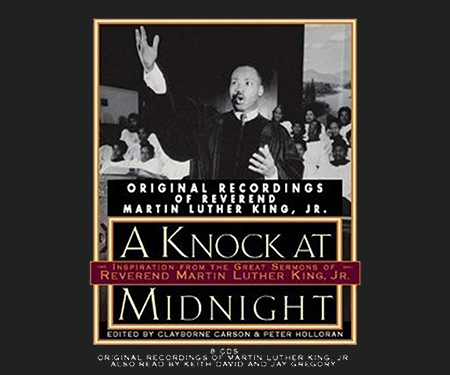449 Auburn Avenue, NE
Atlanta, Georgia 30312
AGAPE – Overflowing unconditional love for all, including adversaries, needed for nonviolent conflict-resolution. Dr. King called it “love in action…love seeking to preserve and create community…love which is purely spontaneous, unmotivated, groundless and creative.”
AHIMSA – The Hindi word for non-injury, or nonviolence made popular by Gandhi as the central value of his beliefs and leadership.
ARBITRATION – Hearing of a dispute and determining its outcome by a mutually-agreed-upon third party. Can be binding or non-binding.
BELOVED COMMUNITY – Term coined by philosopher Josiah Royce to denote an ideal community, used frequently by Dr. King to describe a society of justice, peace and harmony which can be achieved through nonviolence. In his sermon at Dexter Avenue Baptist Church in Montgomery, Alabama, on April 2, 1957, Dr. King said, “The aftermath of nonviolence is the creation of the beloved community.”
BOYCOTT – A campaign of withdrawal of support from a company, government or institution which is committing an injustice, such as racial discrimination. As Dr. King said, “There is nothing quite so effective as the refusal to cooperate with the forces and institutions which perpetuate evil in our communities.”
CIVIL DISOBEDIENCE – The act of openly disobeying an unjust, immoral or unconstitutional law as a matter of conscience, and accepting the consequences, including submitting to imprisonment if necessary, to protest an injustice.
CONFLICT RESOLUTION – Ending of conflict, disputes or disagreements by nonviolent means with intent to achieve a “win-win” outcome for all parties.
CONSCIENTIOUS OBJECTION – A refusal to participate in military service because of moral beliefs.
CREATIVE TENSION – In his Letter from A Birmingham Jail, Dr. King said, “Nonviolent direct action seeks to create such a crisis and establish such creative tension that a community that has constantly refused to negotiate is forced to confront the issue…I must confess that I am not afraid of the word, tension. I have earnestly worked and preached against violent tension, but there is a type of constructive tension that is necessary for growth… the purpose of direct action is to create a situation so crisis-packed that it will inevitably open the door to negotiation.”
DEMONSTRATIONS – Gatherings and protest activities organized to build support for peace, justice or social reform.
DIRECT ACTION – Nonviolent resistance to injustice. More than 250 forms of nonviolent direct action have been identified, including marches, boycotts, picketing, sit-ins and prayer vigils, to name a few. See Six steps of nonviolence.
FASTING – Refusing to eat as a method of self-purification to be spiritually strengthened for nonviolent action, or as a protest.
GANDHI, MOHANDAS K. – (1869—1948) Leader of India’s nonviolent independence movement, who forced the British to quit India. Dr. King studied Gandhi’s successful campaigns and adapted some of Gandhi’s strategies in the American Civil Rights Movement. As Dr. King said of the role of Gandhi’s teachings in the Civil Rights Movement, “Christ furnished the spirit and motivation, while Gandhi furnished the method.” Dr. King said “Gandhi was the guiding light of our technique for nonviolent social change.”
LAWS, JUST VS. UNJUST – A distinction made in deciding to engage in civil disobedience. A just law is created by both a majority and minority, and is binding on both. An unjust law is created by a majority that is binding on the minority, when the minority has no voice in creating the law. Dr. King said, “A just law is a man-made code that squares with moral law or the law of God. An unjust law is a code that is out of harmony with moral law…One who breaks an unjust law must do so openly, lovingly and with a willingness to accept the penalty.”
MASS MARCH – A large number of people walk in a group to a place of symbolic significance to protest an injustice.
MEDIATION – intervention in a dispute by a neutral third party with expertise on a particular issue for the purpose of securing a compromise, an agreement or reconciliation. A mediator can not impose a binding agreement.
MORAL SUASION – Appealing to the moral beliefs of an adversary or the public to convince the adversary to change behavior or attitudes.
NEGOTIATION – Using grace, courage and intelligence, engage the other party with a list of injustices and a plan for addressing and resolving these injustices. Look for what you can learn and for what lends itself to positive results in the opponent’s words and actions. Do not seek to humiliate the opponent but to call forth the good in the opponent.
NONCOOPERATION – Refusal to participate in activities of or cooperate with individuals, governments, institutions, policies or laws that result in violence or injustice.
PACIFISM – A philosophy based on an absolute refusal to engage in violence because it is morally wrong.
PASSIVE RESISTANCE – Challenging an injustice by refusing to support or cooperate with an unjust law, action or policy. The term “passive” is misleading because passive resistance includes pro-active nonviolence, such as marches, boycotts and other forms of active protest.

